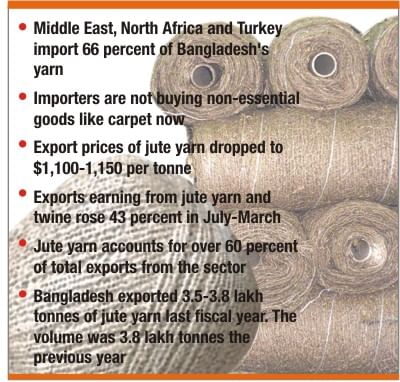Jute spinners feel pinch of Middle East uprising

Jute spinners feel the pinch of a slowdown in the demand for yarn due to the ongoing uprising in the Middle East and some North African countries, exporters claimed yesterday.
Spinners said Middle East, North African countries and Turkey import 66 percent of Bangladesh's yarn to use it as a raw material for making carpet. But people in the region are not in a state to feel the need for carpets due to the ongoing political turmoil and war there.
The slowdown in the demand has led to a fall in prices of jute yarn, they claimed.
''The Middle East is a major carpet market for our buyers. But the crisis has affected the demand for the product there,'' said Muhammad Shams-uz Zoha, chairman of Bangladesh Jute Spinners Association.
Exporters said they have been experiencing a tightened demand and a fall in the prices of jute yarn for the last two-three months as the unrest in the oil-rich Middle East and some North African countries deepened.
Export prices of jute yarn, which was hovering around $1,500-$1,700 per tonne in the August-September period last year, has dropped to $1,100-$1,150 per tonne now, said Ahmed Hossain, managing director of Nawbab Abdul Malek Jute Mill.
The uprising began in Tunisia protesting high unemployment and political repression. It later spread to Egypt, Libya, Yemen, Bahrain and Syria. The turmoil has already toppled Egyptian former ruler Hosni Mubarak and sparked a war in Libya.
''People in the region are not in a mood to buy non-essential goods like carpet. All are concerned about politics,'' said Mahmudul Huq, deputy managing director of Janata Jute Mills Ltd.
“We are worried. We see a drop in the flow of orders for the last two months,'' Huq said.
Although the jute spinners' claim of a fall in demand, export earnings from jute yarn and twine rose 43 percent to $381 million in July-March period of 2010-11 fiscal year, up from $265 million from the previous fiscal.
Exporters, however, said the effect of slowdown in demand and fall in prices on export earnings will be reflected in the later part of current fiscal year.
Jute yarn, which accounts for over 60 percent of total export earnings from the sector, is mainly exported to Turkey.
Muhammad Shams-uz Zoha said carpet factories in Turkey have cut down production because of the Middle East crisis.
''Nobody knows what will happen next,'' he said.
Belgium, Saudi Arabia, Syria, Jordan and Egypt also buy jute yarn and jute goods from Bangladesh.
Bangladesh, a major exporter of jute yarn, usually exports 3.5 lakh-3.8 lakh tonnes of yarn a year against the global demand of up to 4.5 lakh tonnes.
In the fiscal 2009-10, the volume of jute yarn exports was 3.8 lakh tonnes.
Mahmudul Huq feared that exports in terms of tonnage might drop.
Along with the jute yarn, the demand for some jute goods has also slowed down, a senior official of Bangladesh Jute Mills Corporation, seeking to remain unnamed, said to The Daily Star.

 For all latest news, follow The Daily Star's Google News channel.
For all latest news, follow The Daily Star's Google News channel. 



Comments